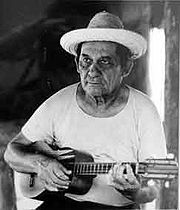
Luis Mariano Rivera
Encyclopedia

Venezuela
Venezuela , officially called the Bolivarian Republic of Venezuela , is a tropical country on the northern coast of South America. It borders Colombia to the west, Guyana to the east, and Brazil to the south...
. He was known not only as a singer, but also as a composer, poet and dramatist.
A self-taught musician and a man of few words, but possessing great sensitivity, Rivera used to say that his first encounter with music was by pure chance. “It was in December. My friends wanted to sing a new parranda
Parranda
Parranda or Parranda de aguinaldo is a musical form from the coastal area of the states Aragua and Carabobo in Venezuela where the tambora becomes present as the main accompanying instrument in an Afro-Venezuelan influence...
but they had no idea where to start, so I wrote a song for them: “Canchunchú Florido”. With this I began as composer.” After “Canchunchú Florido”, Rivera wrote “Cerecita”, “El Mango”, “Cundeamor”, “Carúpano Tierra Mía”, “La Guacara”, and “Mi Comay Juana Maria” and hundreds of songs that have been interpreted by musicians such as Morella Muñoz
Morella Muñoz
Morella Muñoz , was a celebrated Venezuelan mezzosoprano.- Early life and career :She received primary education at the Venezuela Ricardo Zuloaga Experimental school, and the San José de Tarbes school...
, Jesús Sevillano, Gualberto Ibarreto
Gualberto Ibarreto
Gualberto Ibarreto , is a folk singer who plays the mandolin, cuatro, and guitar.During his childhood, he taught himself how to play several instruments after observing popular musicians of the Venezuelan east. He later received some slight knowledge of academic music from Tobías Hernandez and Raul...
, Juan Carlos Salazar
Juan Carlos Salazar
Juan Carlos Salazar is a well known Venezuelan singer and cuatro player. Juan Carlos was born in Caripito, a small town in the State of Monagas. Born to a singer, guitarist and cuatro player and a composer, Juan Carlos learned how to play cuatro and guitar by ear.Juan Carlos Salazar actually began...
, Cecilia Todd
Cecilia Todd
Cecilia Todd is a singer and cuatro executant.From very young the love of music, initially fed by her family group, awakened in Cecilia...
, Lilia Vera and Simón Díaz
Simón Díaz
Simón Narciso Díaz Márquez is a singer and Grammy Award winning composer of Venezuelan music.- Career :Díaz has endeavored to recover the folklore and musical traditions of the llanos, the Venezuelan plains...
, and groups such as Serenata Guayanesa
Serenata Guayanesa
Serenata Guayanesa is a vocal and instrumental quartet that plays typical Venezuelan folk music. It is one of the two best known groups playing this music .-Origins of the group:...
and Un Solo Pueblo.
Biographer Rafael Salazar wrote in his book “Luis Mariano Rivera, Poet and Singer of Express Canchunchú”: “Few popular poets and musicians have had the privilege to be recognized by so many people, regional and national institutions”. Luis Mariano Rivera died on March 15, 2002.

